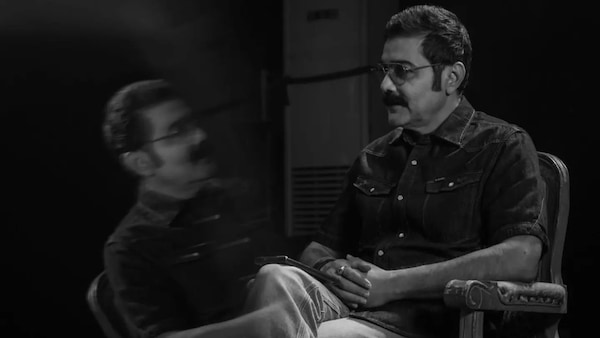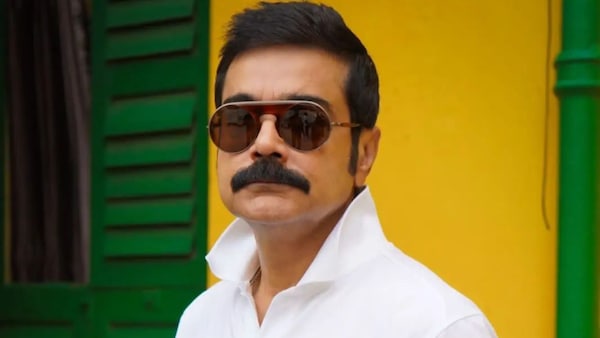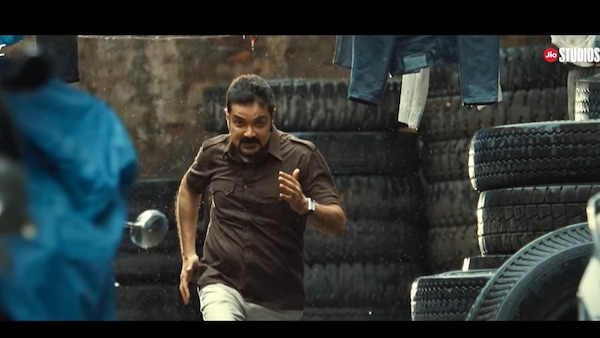Exclusive! Prosenjit Chatterjee on his birthday: Not a resolution, but my dream to sit on the director’s chair should come true now
In a candid chat with OTTplay, the senior actor talked about his birthday resolution, his nostalgia for Probir Roychoudhury, and how he plans to support his son Trishanjit. Read on…

Last Updated: 03.27 PM, Sep 30, 2023
Every single day, Prosenjit Chatterjee proves age is just a number. Here are the proofs: He runs from one city to the other regularly. During the shooting of Dawshom Awbotaar, he shot for 36 hours straight. The list can go on. He says that his zeal to get out of his comfort zone and change the course of his work is the secret of his unending energy.
Prosenjit is all set with his new film, Dawshom Awbotaar, in which he brings back the memory of Probir Roychowdhury of Baishe Srabon. Directed by his old partner Srijit Mukherji, the film also features Anirban Bhattacharya, Jaya Ahsan, and Jisshu U Sengupta. It is Prosenjit’s birthday today and he has a packed schedule, of which promoting his film takes the lion's share. In a candid chat with OTTplay, the senior actor talked about his birthday resolution, his nostalgia for Probir Roychoudhury, and how he plans to support his son Trishanjit to stand on his own. Read on…
What is your plan today?
My birthday usually coincides with Pujo or just the beginning of Pujo. It looks like a busy day. Usually, in the morning, some of my friends, family members, and colleagues come over. I meet a few of my fan club members. I think I will have to wrap it up by 1 pm to 1.30 pm. After that, it will be all about Dawshom Awbotaar. There is a song release. And then there will be a small gathering.
Is there any resolution?
I usually try to do things and live a life that helps me physically. I eat right, exercise, and so on. This is one part. And then there is another part which is more of a dream than a resolution. I will direct a film. The process and preparations are on. As of today, people primarily watch me in front of the camera. I want to go behind the camera and make something. Call it an urge to reinvent myself, this is what I want to do next. Anyway, every 10 years or so, I like to change the course of my work. I tried to change the course of my contribution to the industry…
That seems to be the key to your success and agelessness…
Of course. Srikant (Mohta, producer) and I were talking the other day. He said that he signed me as an actor when I was young. Even today, we work together. Srikant was telling the exhibitors how he felt I was indispensable to them. In fact, Srikant and I put our best foot forward at different junctures of the Bengali film industry. There was a time when we saw a dip in the industry and made Sasurbari Zinbdabad. When Ritu (Rituparno Ghosh) was trying to make Chokher Bali, I told Srikant that this film would be beneficial for everyone, including the industry. Then Srijit came with Autograph and Baishe Srabon and that changed the course of the Bengali film industry. Srikant and I made many hit films individually. But whenever we came together, we tried to bring in some positive changes. Srikant and I have that understanding. I know what he wants and he understands how I perceive something. I work with many producers. But with Srikant, there is this understanding.

You have been having Puja releases for years. Does a Puja release make it more special?
Of course, it does. I have been working in this industry for years. There was a time when my films used to get released during Jamai Shashthi and Poila Boishakh and used to be a super hit. Around 15 years ago, the difference between multiplexes and single screens became broader. That grandeur of Puja releases was fading out somehow. Srijit deserves credit for bringing the grandeur back. He brought Autograph and Baishe Srabon – both Puja releases – and introduced a gush of new audiences to the theatres. Srijit and Puja are a success formula. He made a number of films and I have been a part of many of those, including Gumnami. These days we have multiple Puja releases. People are making films and more people are watching the films. The younger audiences started liking Bengali films with his stories and Anupam’s (Roy, musician) songs. This doesn’t mean that films that are not Puja releases are not important. For Bengalis, Puja is the biggest celebration. We used to wait for Pujor Gaan. So many things have faded away.
Four films are releasing this Pujo. Do you feel competition…
No. I made films. Some films ran for 50 weeks and some films failed to hold for even five weeks. I never believed in such competitions because my biggest competitor has always been me. There was a time when nine films – all featuring me – were running at the same time. I don’t think any other actor across the world will have a record like this. However, there is something I believe will happen this year and I am usually right about that. Recently, we were discussing a collective box office report of a number of national films together. I feel, this year, these four films together will earn that sort of money. One will make 5% less money and the other will make 10% more. But the point is, these four films will earn money. And in our industry, if that much money is earned, 40 new and good films will be made. Srijit has his pull and the nostalgia of Baishe Srabon will be added to it. Dev has his fandom and there will be an addition of Bagha Jatin’s charm. It also has a big mounting. Shibu (Shiboprosad) and Nandita have their set audience. Mitin Mashi has a set audience. One film will be watched before the other but everyone will watch all four films.
Let’s talk about Dawshom Awbotaar. Tell us how it feels to be back again as Probir Roychowdhury.
I never thought Probir Roychowdhury could make a comeback on screen because, in Baishe Srabon, he blew off his head. I used to tell Srijit to make a character like Probir because there was a huge demand. For an actor, playing a character like Probir is a blessing. I never thought I would do this again. But it came with a bigger challenge because Probir is eight years younger than what we see him in Baishe Srabon. I was excited with the character because I knew it would bring back the nostalgia and it did. The trailer was a hit and trended at #1 on YouTube. I think people are now waiting to watch Probir and Podder (Anirban’s character from Vinci Da) together. I have been telling everyone that after watching this film, people will wait for Probir and Podder again. They will be a hit pair. We get to see such pairs in Hollywood – one senior and one junior officer. Two people together become one character. It is an outstanding film that he made. Srijit was joking that after watching this film, Ritu would call me and say, ‘What is this? What did you do here?’

We hope to watch more films of Probir and Podder…
Srijit wants to do more…
You worked with Srijit on a number of occasions. Tell us about your director-actor bonding…
We did nine films together. We share something like a couplehood. When a couple gets married, their chemistry, understanding, and bonding develop over time. Srijit and I also developed that bond. We have our share of disagreements – always about work and never personal. And then it all settles down. I had a similar bond with Ritu. Our understanding is very clear and we have immense respect for each other’s work. If Srijit suggests something, I consider it an honour, and if I suggest something he honours that. He has evolved as a director. He is not the same one I met during Autograph. He has a long list of his work. The understanding between us is clearer. There are times when both of us felt bad but everything gets ironed out. I always say that the relationship between a director and an actor is like that of a husband and wife. It is true for us.
Jubilee reinstated you once again on the national platform. You have a setup in Mumbai now. And you are indispensable in Tollywood. How are you planning to manage?
It is not true that I am indispensable. In the Bengali film industry, I am like an elder brother. The next generation is very talented and they are doing great work. Also, I have never left Bengal. I will never leave this place. Yes, I will probably work on one or two projects in a couple of years. See, I cannot work on anything and everything. I will have to remember that there are contributions of many people – my directors, co-actors, and technicians – who made me the Prosenjit Chatterjee that I am today. If I do anything anywhere I will have to respect their contribution. I represent my industry. I will have to choose and execute works that reflect that responsibility. In fact, people perceive me like that only. I intend to only play characters that have that kind of impact.
How are you managing time?
I only work and don’t engage in anything else. Time management is something I have been doing for 40 years. If I am in love with what I am doing there is no problem. In Dawshom, I shot for 36 hours straight. The day I feel exhausted, I will retire.
What’s next?
I will start working with Kaushik (Ganguly) on a film with Rituparna (Sengupta). And there is Devi Chowdhurani. I can only talk about these two films.
After Hindi, will you explore the Bengali OTT space as well?
I will only if I get that kind of character. I have no problem working here as long as I get a fitting character. That character has to match the magnanimity of Roy Babu (of Jubilee). It has to match the power of Roy Babu or Probir Roychowdhury. I want that power.
Let us talk about Trishanjit, your son. If he comes to the industry, will you welcome him or would you rather want him to excel in other industries?
In whichever industry he goes to, I want him to be the number one. If he comes to my industry, I will train him well, as much as I can. I will prepare him with basic education, and on-field work. Then he will have to fend for himself. He can work under my direction but I will never be the father who produces films for his son. He will have to make his own life on his ability.

 Premium
Premium